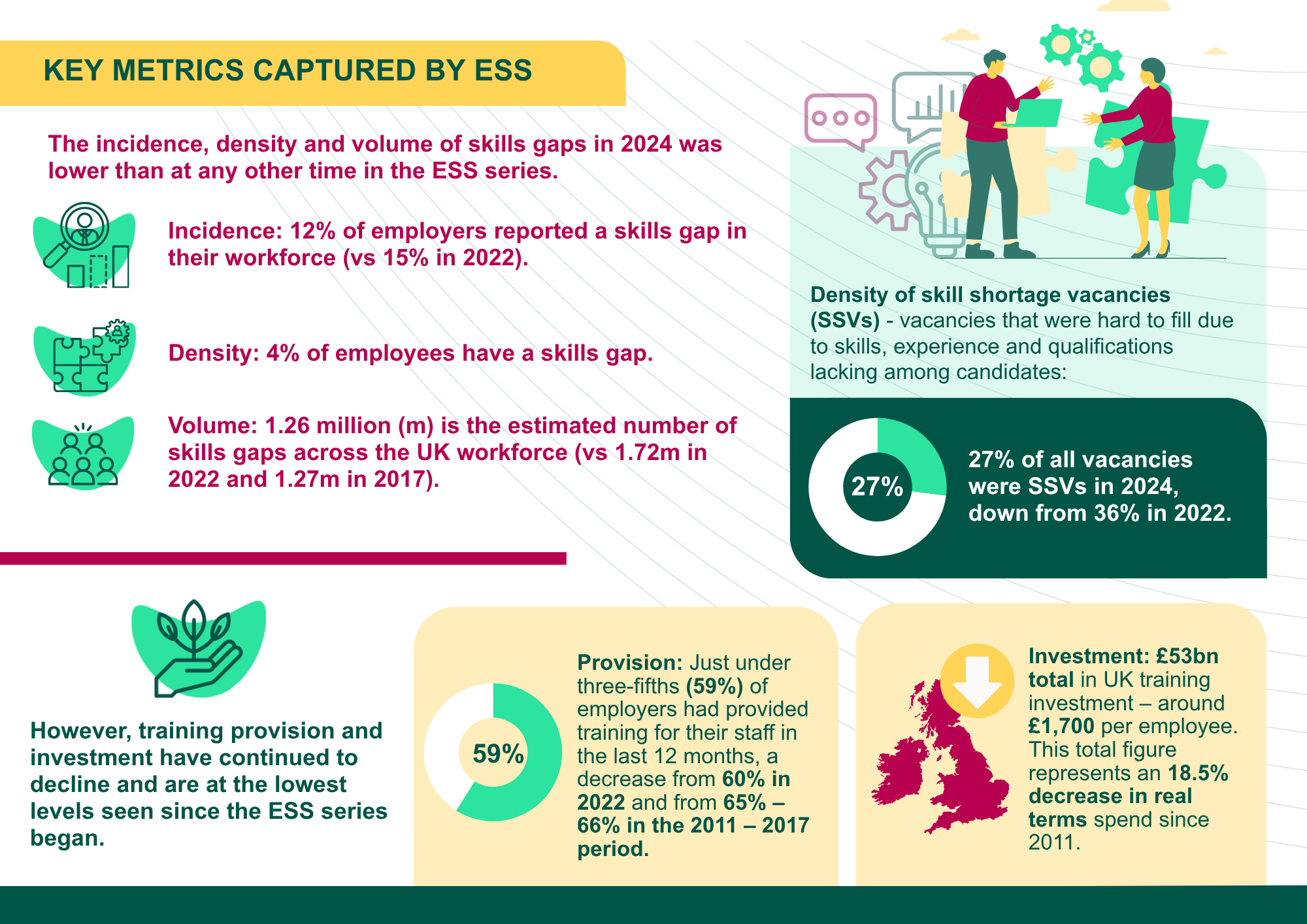
In this fifth project showcase, we spotlight the Employer Skills Survey (ESS) – a survey we’re proud to have delivered since its inception in 2011. The ESS provides robust, nationally representative data to help the Department for Education and its partners to understand the key challenges in the UK labour market.
The Employer Skills Survey (ESS) is one of the largest surveys of employers in the UK, with tens of thousands of interviews conducted in each iteration. Its large sample size enables comprehensive analysis at national, regional, and sectoral levels, offering granular insights into local labour markets. For 14 years, IFF has helped the Department for Education and its partners track how employers experience and respond to skills gaps, recruitment challenges, and training needs.
The Department for Education (DfE) is responsible for children’s services and education in England, covering early years, schools, further and higher education, apprenticeships, and skills development. Its mission is to provide high-quality education and training that offers equal opportunities for all, regardless of background or circumstances.
The DfE is the primary commissioner of the ESS, but the survey is a collaborative effort across all four UK nations. The Department for the Economy in Northern Ireland, Welsh Government and Scottish Government also contribute to the design of the survey, ensuring it reflects the diverse needs of the UK labour market.
The challenge
The demand for a comprehensive picture of the skills landscape in the UK has been ongoing for many years. The Extent, Causes and Implications of Skills Deficiencies (ECISD) survey – originally developed with IFF involvement in the 90s – was one of the earliest forms of national statistics on this topic. It’s had a number of different forms since then, eventually being established as a longitudinal survey once its value became evident. The ESS, launched in 2011, builds upon the ECISD survey to provide a comprehensive overview of the challenges employers face in relation to recruitment, skills and training. IFF have been the DfE’s main partner on the project since.
The ESS has gone on to become the largest skills survey in the UK. It provides a ‘state of nation’ view of employers’ recruitment, skills and training needs and responses. Now in its sixth UK iteration stretching back to 2011, policymakers can identify trends and patterns relating to these needs; this is vital when intelligently informing high-profile policy decisions.
The approach
Overall, the survey covers three core areas:
- Skills shortage vacancies (hard-to-fill roles due to a lack of required skills, qualifications or experience among applicants)
- Skills gaps within the existing workforce
- Training and development activity and investment
With a sample size that has reached up to 90,000 employers in some waves, the ESS offers excellent granularity across these core areas – allowing for detailed analysis by sector, region, and employer size.
To produce such a large dataset that’s representative of UK employers, CATI (Computer-Assisted Telephone Interviewing) surveys are used to talk to employers, while the sample is drawn from Market Location and the ONS Inter-Departmental Business Register. Random Probability Sampling was introduced in 2022 to improve the representativeness of the survey and reduce non-response bias.
In order to keep the statistics current, relevant and valuable, questions from other surveys have been utilised to broaden its scope or provide further insight. In 2019, the ESS was merged with the Employer Perspectives Survey, expanding to include employer engagement with the wider skills system – such as apprenticeships and work placements. This required a substantial redesign and the introduction of modularisation, allowing tailored questions for different respondent groups.
A follow-up Investment in Training survey, which speaks to training employers, allows the survey to estimate employers’ financial investment in training and development. This gives a fuller picture of how employer training investment aligns with skills needs, supporting more informed policy decisions and strategic workforce planning.
The impact
The ESS has been instrumental in shaping conversations around recruitment challenges, skills shortages and workforce development. It serves as a vital evidence base for policymakers, academics, and workforce planners across the UK.
Significant long-term trends have been identified through the data. One is the steady decline in employer investment in training since 2011 – a finding that has drawn increasing attention from policymakers. The survey also captured the tightening of the labour market in the immediate post-COVID-19 period, with a notable rise in skills shortage vacancies in 2022.
Recently, ESS findings featured prominently in the development of Skills England, the Industrial Strategy, and the Post-16 Education and Skills White Paper.
The latest 2024 findings will include new insights into AI adoption and net zero strategies, helping policymakers understand how employers are preparing for future challenges.

“The Employer Skills Survey provides robust evidence on the skills needs and shortages faced by employers across the UK. It is source of intelligence for the Department for Education, helping to shape and inform a wide range of government policies and initiatives.”
Department for Education
Download case study
To find out more about this project, or how we could help you, contact us at hello@iffresearch.com. You can also download the case study here.